#good omens clothes and equivocation
Text
CORRECTED & UPDATED! Clothes + Equivocation = Romance:
The Husbands in 1793
EDIT: I made a significant error when I wrote this. As @goodjomans kindly points out in the comments to Part 2 of this essay (massive shoutout for this, goodjomans! also I love your name!), Aziraphale is the one who dresses the executioner in clothing like Aziraphale's original ensemble, not Crowley. This changes my conclusions about the meaning we can take from this scene!
On the one hand, mea culpa, y'all. I shall get on with eating my crow. On the other hand, I had to go through this frame-by-frame to catch which of the ineffable spouses puts Jean-Claude in his new togs, and the answer only lasts three frames. Here it is:
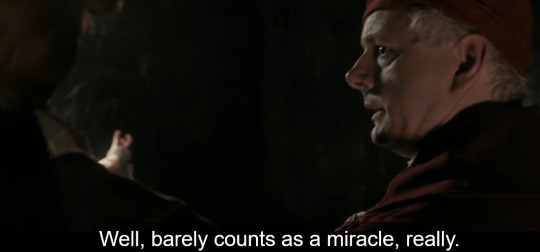
After Aziraphale changes his clothes, but before Crowley snaps his fingers and unfreezes time, there's a shot of the executioner over Crowley's shoulder, and he is now wearing a light coat with gold embroidery on the shoulders like Aziraphale's. Aziraphale arranges the executioner's death, not Crowley. So I feel like an idiot for missing it, but not a total idiot.
Let's discuss how this information changes what we can read from this scene! I'm going to leave my original text in place and edit with bold green. I can still stand by most of this essay, but this detail changes how I read the meaning of the husbands' communication at the end of this scene.
So we're all clear on the fact that the universe of Good Omens is an inescapable nightmare dystopia in which either of the husbands' merciless authoritarian regimes could be watching or listening to them at any time, yes? And that if either are caught 'fraternizing' with the other that means discorporation, torture, memory wipe, and/or death for either or both of them, yes?
Which means Crowley and Aziraphale can never speak or do anything openly to each other about their friendship or attraction or love. Everything they say and do has to have an innocuous meaning they can point to in case anybody ever sees or hears something Team Azcrow can't explain away. Walls (and ducks) have ears, and the price of slipping up--as we see in 1827--is heavy.
When a character says or does something that has two distinct meanings because they need to disguise what they really mean from one party but make their meaning plain to another, lit-nerds (and lit nerds🍃) call this equivocation. Equivocation is a kind of coded communication meant to pass hostile ears and eyes in plain sight but reach its intended recipient with its true meaning. The 1793 scene is jammed with it.
A lot of that coded messaging revolves around the clothes Crowley and Aziraphale choose in this scene, so--THESIS PARAGRAPH, BITCHES--we're going going to talk about how their clothes read to the people of this time period and location, what their clothes tell us about their characters, how their clothes help them equivocate, and what they're really saying with that equivocation. And Spoiler A-fucking-lert, it is ROMANTIC AF PRETTY GD ROMANTIC. Let's get nerdy!
We start with Aziraphale's beautiful champagne-gold and powder-pink ensemble.
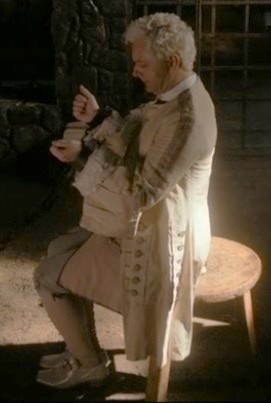
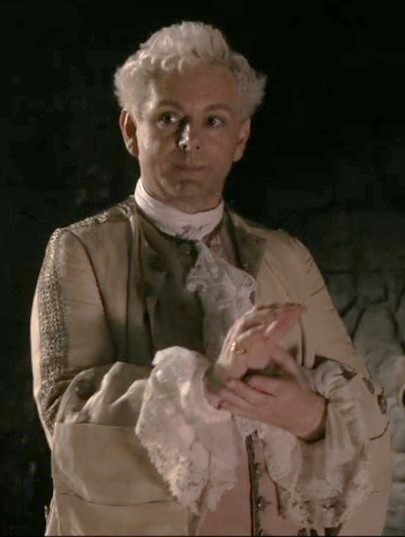
This outfit would tell people of this time period 3 things about Aziraphale:
That he's insanely wealthy--These clothes would be silk, hand-embroidered with thread made with actual gold. Each individual garment could cost years' or even decades' worth of working-class wages and take a team of skilled artisans dozens to hundreds of hours to make.
That he's a fop--i.e., a man who loves fine clothes and dressing up and looking fancy. By the 1790s in England, once-fashionable foppishness was giving way to the Neoclassical 'Corinthian' style, and was considered effete. (Fun note: During this time period, effete did not automatically indicate gay, and pink was considered a masculine color, so while Az. is queering it up to the audience here, his clothes would not have read as gay or overtly effeminate to the other characters around him.)
Even though he's insanely wealthy, Aziraphale wears clothes that are decades out of fashion.
According to the Victoria & Albert Museum, "As the [18th] century progressed, the male silhouette slowly changed.[...] Coat skirts gradually became less full and the front was cut in a curved line towards the back. Waistcoats became shorter. The upper leg began to show more and more[...]. Shoes became low-heeled with pointed toes and were fastened with a detachable buckle and straps or ribbon[.]
Source
That description is not what Aziraphale's wearing. Judging by his heel height and the length of his waistcoat, Aziraphale is wearing a style that's at least a decade older than this:
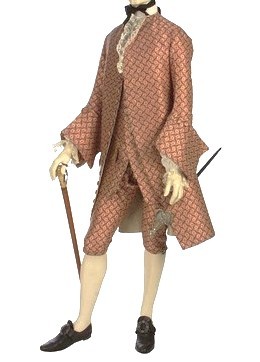
And this is from 1765. The great crepes caper happens in 1793, almost 30 years later.
My inference: Just as he has in the modern period, Aziraphale has settled into a style he really likes and refused to let go of it long after it's gone out of fashion.
We'll come back to this set of Aziraphale's clothes in a bit, but we need to talk about Crowley's first, because Crowley's clothes in this scene help render a line he says later about this outfit very flirtatious and darkly romantic.
First, some background: What was considered acceptable attire for wealthy people in France changed pretty much overnight during the French Revolution after the storming of the Bastille in 1789 and the fall of the French monarchy. Instead of advertising wealth, clothes now had to advertise political allegiance, and they had to do so loud and clear. And if you didn't want to be murdered by the French First Republic, that political allegiance had fucking better be to the Revolution.
People started wearing a looooooot of super patriotic shit. And I mean it was like little kids on the 4th of July; clothes were red, white, and blue in any hue and garish combination and print. The cockade, a fabric rosette in the colors of the French flag, was required by law to be worn by men, and despite that was just as popular among women. To show solidarity with the laboring classes, the fabrics the wealthy wore went from embroidered silk in light Rococo colors (what Aziraphale is wearing) to sober neutrals without decoration in wool, cotton, and linen.
Now, the script note for Crowley's clothing in this scene is this:

But clearly there were some changes made between script and filming, because Crowley does not appear standing behind Aziraphale; he appears lounging.
And he's not dressed as a French peasant.
Here's how French peasants dressed in 1790:
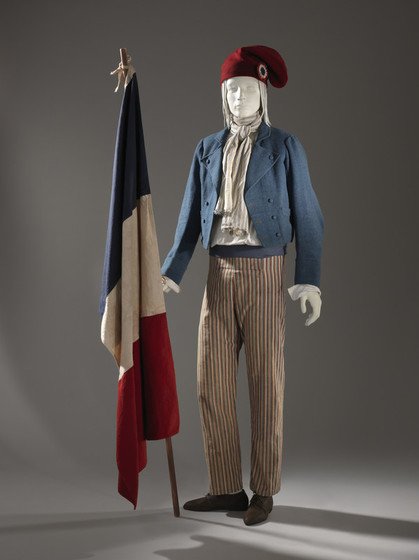
Peasants at this time wore styles that distinguished them from the styles of the upper classes not just in materials, colors, or patterns, but in shapes. Full trousers and cropped boxy jackets in French flag colors were the marks of the laboring-class Revolutionary, and both styles were huge changes from hundreds of years of French fashion up to that point.
And that's not what Crowley shows up wearing. Crowley is wearing the knee breeches, stockings, waistcoat, and frock coat of a wealthy man, and in fact his clothes reference a very specific type of wealthy man.
In the 1790s, if you were an aristocrat who wasn't happy about the Revolution and you were so sure of your privilege that you would risk your life showing it, you wore black in mourning for the monarchy and in protest of the violence of its deposition. If you were an aristocrat who wanted to protest and you didn't want to be immediately murdered by the French First Republic, you wore a style called half-mourning, which was black with a colored coat.
Here's a picture from a 1790 fashion magazine of an aristocrat in half-mourning:
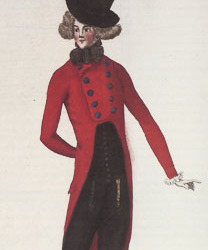
"The text accompanying the plate describes his ensemble as 'half-mourning,' referring to the aristocrats who lamented 'the diminished powers of the monarchy and [signaled] their willingness to die for the royal cause'" [emph. added]. [Source]
Notice: the shoes, stockings, breeches, waistcoat, and cravat are all black. You with me?
Because here's Crowley in 1793:
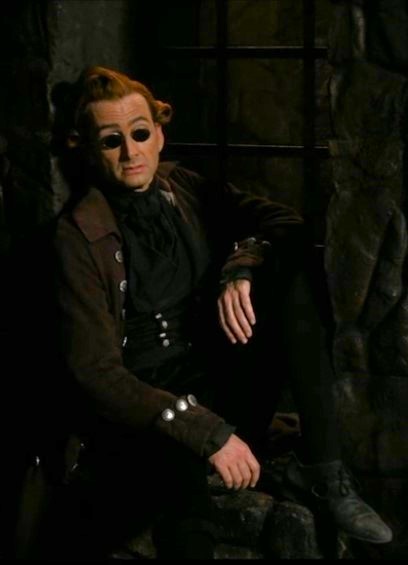
I've turned up the brightness and exposure in this image so he's more clearly visible against the stone, but I haven't warmed it up. He's wearing a coat that's a dark blackish red. Everything else, even his cravat, even his shirt, is black. (The black shirt is anachronistic, a lovely little nod to Crowley's refusal to wear angelic white.)
This is 179fuckin'3, y'all. Marie Antoinette is executed in 1793. It's 3 full years after that fashion plate up there in his bright red jacket, and that lil dude was already risking his neck way back in 1790. As we can see from the fact that the government are apparently now grabbing random wealthy-looking Englishmen off the street to murder without trial, the time for a man demon to be sauntering around Paris dressed in all black or even nearly all black is well past.
Crowley's also wearing a whole assload of huge silver buttons, which would have been flashy and tacky and frankly pretty weird in 1793 but very definitely an eccentric Rich Person Thing to do, bc regular buttons at this time were horn or wood and covered with the garment's fabric. The only man in France who could get away with this fancy aristo shit anymore was Robespierre himself, and only "devotion to the cause[...] excused Robespierre’s showy dress since he was perceived as a bridge between the politically empowered bourgeois deputies and the ardently antimonarchical unenfranchised classes." [Source]
So when Crowley teases Aziraphale--
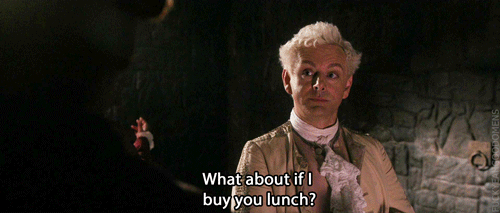
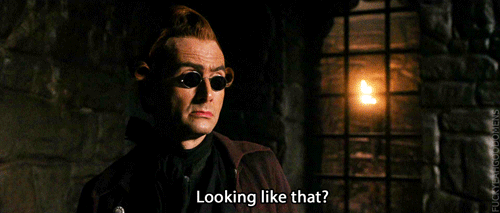
--both of them are perfectly well aware that Crowley's outfit would get him just as killed as Aziraphale's.
And that's why Aziraphale's expression is annoyed when he has abandon his "standards" and change his clothes. Because Aziraphale's the one who needs the favor, Crowley makes him take one for the team and wear the goofy hat.
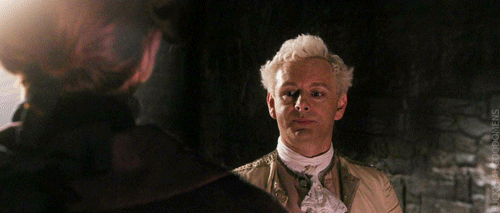
The clothes Az. changes into here still tell people that he's rich, but they also say he's a hardcore Revolutionary. The red jacket in a current cutaway style, the cockade and sash, and the bonnet phrygien (the red garden-gnome cap) all announce this guy is a huge supporter of the Revolution. His clothes are all still aristocratic in shape and materials (and he keeps his now-unfashionably frilly lace cravat), but he's no longer flaunting obscene wealth in a city filled with angry starving people, and the gnome cap says he's in solidarity with the working classes even if he isn't one of them.
Once he restarts time, Crowley is not leaving that prison cell safely without either changing his clothes or taking Aziraphale with him, because Crowley looks like a rich asshole protesting the fall of the monarchy--which is frankly exactly the kind of thing he'd show up wearing to the Bastille during the Reign of Terror (just like he wears athleisure in Heaven). But Aziraphale's new appearance covers for them both: if the rich-looking guy with no cockade and wearing all black under his almost-black coat is in with this other guy who's obviously a Revolution fanatic, then the rich guy's probably okay, right? He just forgot his sash at home or something. Bees.
Something else happens when Az. changes, too. Look at Aziraphale's new dress from a different angle:
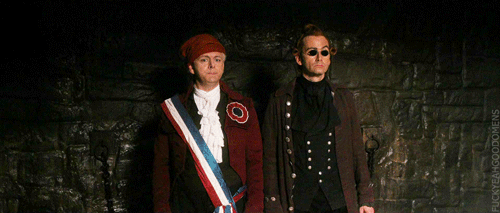
Half-mourning is a white shirt, but a black cravat, so this isn't half-mourning. He's wearing three different badges of the Revolution to make up for the fact that Crowley looks like a Satanic libertine (which tbf he is), but Aziraphale's new ensemble is black and dark red.
Y'all. Aziraphale changes into Crowley's colors.
Now, this is a more fashionable and higher quality version of what the executioner is wearing, so Aziraphale has very plausible deniability here; if anyone ever pulled him up on it, he could say he just copied our man Jean-Claude.
But let me show you what English fashion looks like right now:
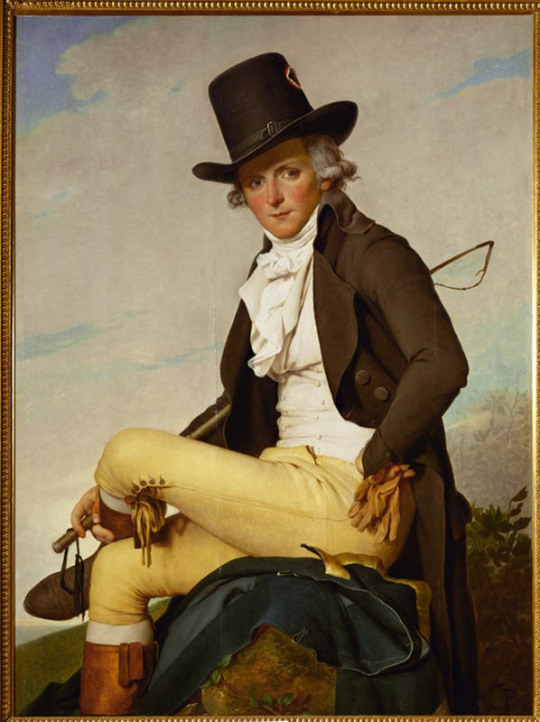
This is a French painting of a wealthy Frenchman, but he's wearing the English 'Corinthian' style. It was painted in 1795, so this would have been the very cutting edge of fashion in England in 1793, and the fabrics and colors look right at home in Revolutionary Paris. (He's wearing the cockade on his hat, btw.)
Look at all that angelic white! The buttery almond of the buckskin breeches, the golden kidskin gloves, the rich tan of the riding boots! The blue of the greatcoat! All colors we know Aziraphale prefers!
And yet this is what Aziraphale chooses:

We know from the entire rest of the show how very particular about his clothes Aziraphale is. And yet 150 years before he (accidentally) admits in words that he's Crowley's friend, Aziraphale wears Crowley's colors to take him to lunch to say thank you for a rescue.
When we decide whether a character's speech or action is equivocation, one of the things we check is whether equivocation (and deception generally) is something that character does elsewhere in the text, which, with Aziraphale, hahahahaha, DUH. He's already using equivocation in this scene.
The lunch date itself is equivocation on Aziraphale's part. Aziraphale tries to thank Crowley for the rescue, but Crowley says,
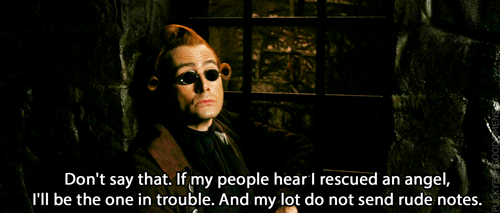
So Aziraphale says,

No more words like "thanks" or "rescue" used, but a couple hours of good food and drink and conversation, Aziraphale hopes, will express the gratitude toward Crowley it's not safe to speak aloud. With this, Crowley and Aziraphale explicitly establish that they are equivocating for each other's safety and using coded communication--immediately before Aziraphale changes into Crowley's colors.
So yes, Aziraphale may well copy the executioner's clothes. But consider: When a character who can't speak or act openly says or does something that has two or more possible meanings, this can be read as equivocation.
We don't get a face reaction from Crowley about Aziraphale's new 'fit, so we can't be sure how he feels about this. But this whole scene is, even on its surface, about 1) the meaning clothes transmit to a viewer ("Oh good Lord," says Aziraphale when he sees what Crowley's wearing) and 2) how to show gratitude and appreciation when you can't speak of them openly. And we know Crowley notices clothing and clothing colors, because look at what he wears, like, ever. So it's very reasonable to presume he notices Aziraphale wearing his colors, and it fits well with both the rest of Crowley's actions in this scene and with his being very hurt and angry when Aziraphale later characterizes their interactions as "fraternizing."
Right, so we've covered what's going on with the husbands' clothes, and we've looked at two examples of equivocation on Aziraphale's part, viz., lunch and his change of colors. (Here's an example of equivocation on Crowley's part as well.) Now let's look at that super interesting thing Crowley says about Aziraphale's first outfit.
Here's the line:
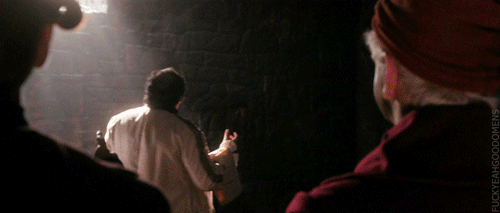
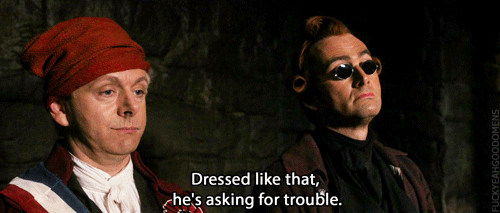
Crowley follows up here on earlier lines in which he teases Aziraphale for coming to Reign-of-Terror Paris for crepes: "Dressed like that?" meaning Aziraphale was guaranteed to get arrested dressed like an aristocrat. The top layer of equivocation is always an innocuous meaning: the plausible deniability meant for the hostile/unsafe listeners. That's Meaning 1.
But "Dressed like that, s/he's asking for trouble" means two other things, too. It's a veeerrrrry familiar phrase, isn't it? We've all heard that arrangement of words in that order before. It's used when people think someone (usually but not always a woman) is dressed to invite sexual attention.
How do we know we're supposed to take this modern meaning from this phrase? This is how:

We have learned in literally the previous sentence to this one that rain has not been invented yet. The only two humans in existence have just left the Garden. Balloons definitely do not exist yet, humans couldn't tell you what lead is, and yet this is a phrase Crowley uses and Aziraphale understands. This tells us, the audience, in the very first line of the very first scene with these characters, that their speech is anachronistic and modern, and that we are to understand their phrasing in its contemporary sense.
So. When Crowley says "Dressed like that, he was asking for trouble" in 1793, we should read that in the context of the scene and in the senses the phrase carries to us today.
And since Crowley is using a phrase that means the executioner is dressed to invite sexual attention, and the executioner is wearing clothes identical to Aziraphale's, then Crowley is necessarily telling Aziraphale that when Aziraphale was wearing those clothes--those frilly, effete, unfashionable-for-decades clothes that nobody else likes and the French now murder people for wearing--that was, in Crowley's view...provocatively sexy. Meaning 2.
"Dressed like that, s/he was asking for trouble" is also what people say to justify violence, especially sexual violence against women and queerphobic attacks against men perceived as gay or just 'insufficiently' 'masculine'. In fact justifying assault is likely the most common way this phrase is used today by a wide margin. Meaning 3.
Crowley's joke isn't even really a joke in this sense; it's a vicious barb. And, because it must, it sounds like it's at Aziraphale's expense: You wore the wrong clothes, you weren't careful enough to guard yourself against the men who want to do you harm, so you deserved the trouble you got. Meaning 1.
Except remember: Crowley is also dressed for trouble. And Aziraphale is aware of this. Crowley's 'fit would be almost as offensive to the Revolutionary French of 1793 as Aziraphale's Rococo pastels, and probably just as likely to get him arrested and murdered by the state if he weren't making letting Aziraphale keep him safe by wearing the cockade and the silly hat. Crowley's not saying anything about Aziraphale here that he's not also saying about himself; and as we know from Aziraphale's initial "Oh good Lord" when he turns around and sees Crowley's black and red half-mourning (with extra black and gobs of silver), Aziraphale knows it.
Then why the rapey joke, Crowley?
This is fucking why:
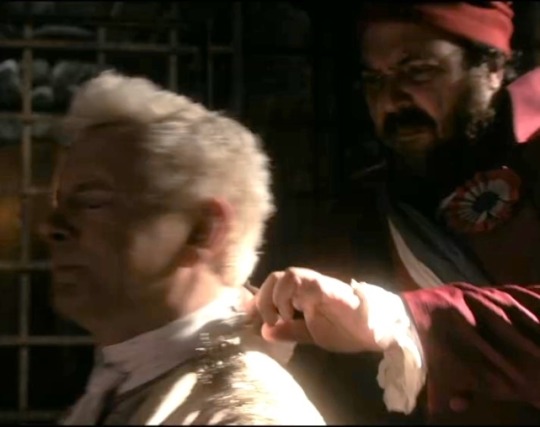
Crowley rocks up at the Bastille just in time to witness some grubby fucker assault his friend. Assault the person Crowley will greet 15 seconds after this as angel.
Crowley's first act after freeing Aziraphale is to send this dude to his death. Nope! Aziraphale is the one who arranges to have the executioner killed in the clothes he would have killed Aziraphale for wearing. He takes Jean-Claude's ability to speak (but not to make sounds, interestingly! Jean-Claude can still whimper, Jean-Claude can still cry!) so the executioner can't tell anyone about the 'mixup.' It's unclear which of them blocks the executioner's power of speech. The vicious joke about assault in Meaning 3 isn't at Aziraphale's expense at all. It's not You wore the wrong clothes, so you deserved the trouble you got. It's If this guy thinks you deserve trouble for wearing the wrong clothes, he can eat his own rules.
And that's the other piece of evidence that, along with Crowley's ensemble, shows us the audience and Aziraphale which meanings Crowley intends with his equivocation. Meaning 1 is cancelled out by Crowley's clothes. That leaves Meanings 2 and 3.
Crowley and Aziraphale share clothes as a common interest. They don't have the same style, but they're both aware of current fashions, and Heaven and Hell aren't. You can't tell me Hastur or Uriel would recognize the significance of Crowley saying "Dressed like that, he's asking for trouble" about someone else while wearing black stockings and cravat and waistcoat himself. And that means Anything the husbands communicate to each other through clothing choices goes undetected by their masters.
SO. With all this in mind, let's go through the 1793 scene again and look at what their clothes help them say without words.
Concluded in Part 2!
#good omens#good omens 2#good omens s2#good omens costumes#good omens fan theory#good omens meta#good omens analysis#aziracrow#azcrow#ineffable husbands#aziraphale x crowley#azicrow#good omens 1793#good omens 1984#good omens clothes and equivocation
548 notes
·
View notes
Text
CORRECTED & UPDATED Clothes + Equivocation = Romance:
The Husbands in 1793 (Part 2)
From Part 1:
Crowley and Aziraphale share clothes as a common interest. They don't have the same style, but they're both aware of current fashions, and Heaven and Hell aren't. You can't tell me Hastur or Uriel would recognize the significance of Crowley saying "Dressed like that, he's asking for trouble" about someone else while wearing black stockings and cravat and waistcoat himself. And that means Anything the husbands communicate to each other through clothing choices goes undetected by their masters.
SO. With all this in mind, let's go through the 1793 scene again and look at what the husbands communicate to each other without using words or actions to do it, and how their clothing choices help them do that.
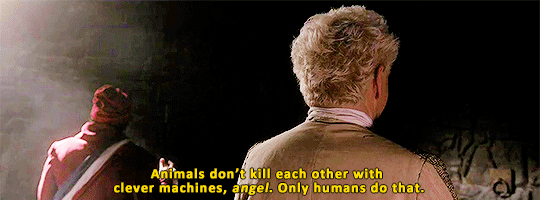
Hello. I'm here and I know you're in a spot of trouble. I like you.
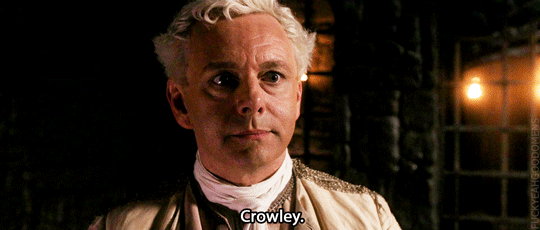
It's you! I'm so happy you're here!
Sheen's voice and face when Aziraphale says Crowley's name in this moment makes me think that Aziraphale is in love with Crowley--the demon Crowley, not the angel who became Crowley--long before he consciously realizes it in 1941. The way Sheen has Aziraphale say Crowley's name is so soft.
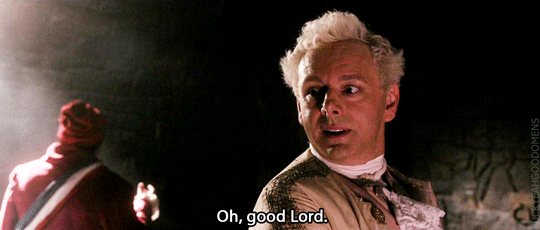
The way you're he way you're lounging there and what you're wearing are uncomfortably sexy and also incredibly inappropriate for the Bastille at this moment in history. I suppose this is very on-brand for you.
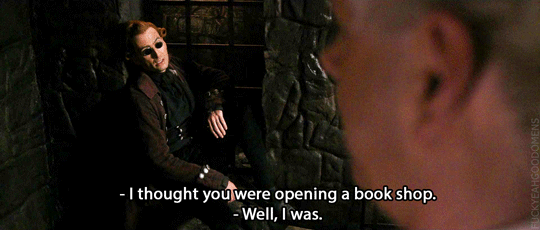
Crowley: I listen when you talk about your interests and goals and keep track of your general whereabouts and pursuits.
Either they've spoken with each other recently or Crowley has been keeping tabs on Aziraphale. Aziraphale isn't upset that Crowley knows what he's been up to, which suggests the former, which in turn suggests they're in semi-regular (every few years or decades) contact at this point.
Also we've now got a general idea for when Aziraphale opens his bookshop.
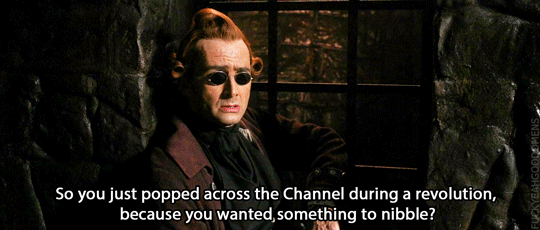
Okay, brief tangent while I point out two things here.
One, my favorite thing about Aziraphale is that he is a sensualist. This is libertine behavior, y'all. He 'popped across the Channel' during the Reign of Terror because he wanted a specific carnal experience of a specific really lovely food.
And two, even when Aziraphale does weird, frivolous, silly, ill-advised things like this, things that clearly baffle Crowley...Crowley never makes fun of him. He never laughs at him. He always has this look of disbelief on his face, like Am I hearing this?--

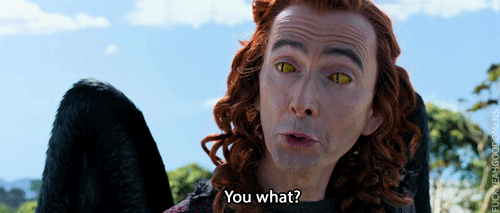
--but Crowley never, not once, shuts Aziraphale down.
Until Aziraphale asks him to go back to Heaven.
Anyway. Back to our scene.
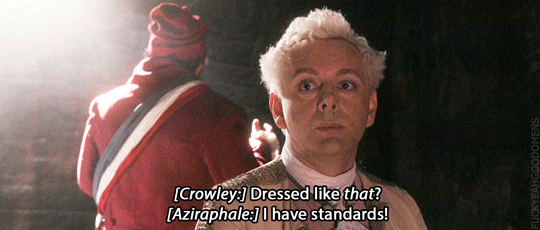
Aziraphale: I am unwilling to abandon my sartorial sensibilities even when it threatens my corporation, and I am insane, so I think this is reasonable. At least I'm not wearing a Slutty Monarchist outfit.
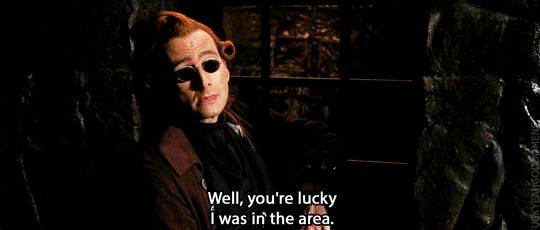
You're happy to see me, aren't you. You're relieved to see a demon. Go on, say it.
Tennant's delivery of this line cracks me up. It is so gloating and flirtatious and smarmy and indulgent of Aziraphale.
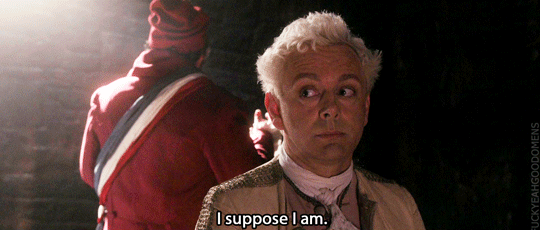
I am very happy to see you and lucky you're here, and I am willing to say so sincerely even though you are gloating about it.
And then there's the exchange where Crowley very carefully doesn't answer Aziraphale's question about why Crowley's in the area but also reassures him that he didn't cause the French Revolution and Aziraphale can still like him.
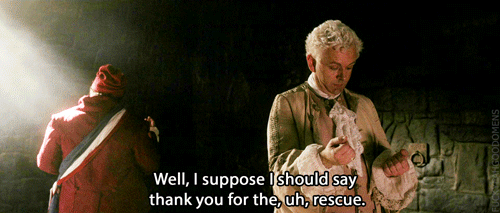
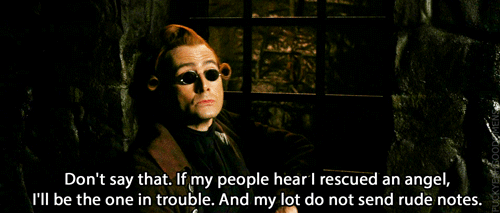
We can't speak openly about this. It's dangerous for me.
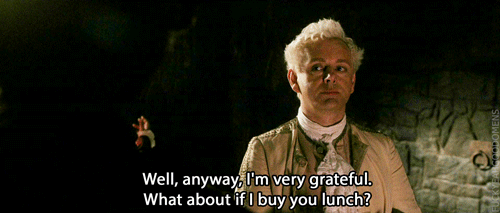
Message received: I won't mention what you did again. But I want to show my gratitude and spend time with you; is it safe for us to get lunch together?
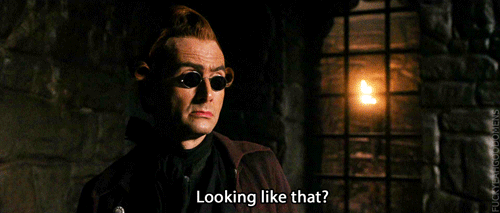
Yes, but one of us is going to have to change so we can walk the streets of Paris without getting arrested again, and I'm the one doing the rescuing here so it's not going to be me. Your 'standards' will have to take the hit.
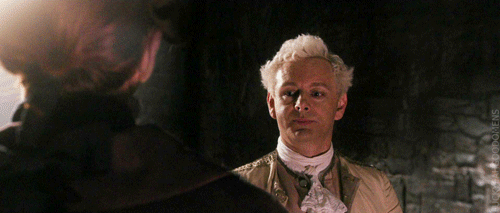
Fine, you've got me over a barrel. But hey, if I have to wear the silly hat anyway I might as well go all the way and wear your colors. Except not monarchist. And not slutty.
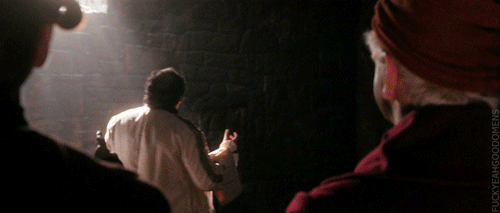
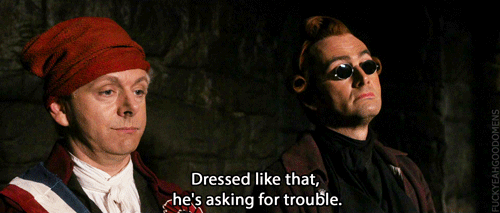
Oh, I don't know, I thought you looked pretty slutty too. (Meaning 2) I'm having this guy killed for touching you, btw. I will kill anyone who tries to hurt you. Immediately. I see you are having the guy who assaulted you killed in a copy of the clothes he would have killed you for wearing. I wholeheartedly approve of this (Meaning 3), your sexiness in those clothes notwithstanding. The utter insouciance of Crowley's little sniff and the inquiry about what they'll have for lunch drive home hard that Crowley could not be more unbothered by Aziraphale having the man who tried to harm him beheaded.
What really tickles me about this line is not only that Crowley's joke has three distinct meanings, but that Meaning 1 (the meaning that exists without reference to Crowley's clothes) is the opposite of Meaning 3--Anybody wearing clothes like that deserves what they get (Meaning 1) versus It rocks how you just killed someone who tried to kill you for wearing those clothes (Meaning 3)--and yet because of the clothes he's wearing, both meanings come through with perfect clarity, dependent only on whether the listener(s) can see his clothing and know its significance. Aziraphale can, and does, so he receives Crowley's real meaning. Hell/Heaven can't, and don't, so they just hear Meaning 1.
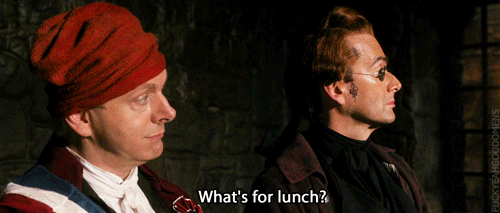
And then we get Aziraphale's pleased little smile and look of tranquil interest as he watches Jean-Claude dragged off to his death. Its such an interesting facial expression for an angel watching a demon have someone killed having someone killed, isn't it?
Crowley has just told him they're probably being listened to by Hell. That means Aziraphale, Crowley, and the audience all know this is the most Aziraphale can safely react. Aziraphale can't show any overt approval of anything an agent of Hell does, because by definition anything a demon does is demonic and angels must be against That Sort of Thing. In light of the fact that Aziraphale is the one who causes Jean-Claude's death, I now argue that this responsibility not to react too positively to something the other side has done falls on Crowley, and that the reason he makes this joke is primarily to tell Aziraphale I see what you've just done, and I like it without identifying aloud what exactly has just happened for their presumed eavesdroppers because an angel arranging a human's murder is the sort of thing in which head offices might take undue interest.
The awareness that their conversation is not private means the audience and Aziraphale know they need to be watching and listening for multiple meanings from Crowley, and it also means the audience and Crowley know we need to be watching Aziraphale's face closely right now. And that little smile shows us that Aziraphale has received Meanings 2 and 3 of "he was asking for trouble."
Or, at minimum, Meaning 3; even if Aziraphale picks up on Meaning 2--You looked really sexy in your vintage clothes, you crazy weirdo--that's not a message he can afford to react to at all. But he does react to the other coded communication Crowley is sending when he says "Dressed like that, he was asking for trouble" while dressed for trouble himself: I will kill anyone who tries to hurt you. Immediately. People who think your clothes give them the right to hurt you can go to Hell, and I am delighted you just sent one of them there.
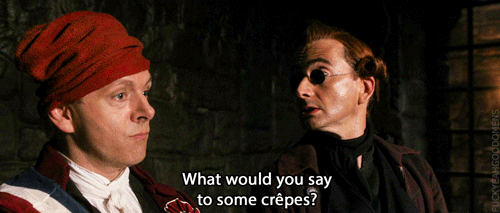
You just had someone beheaded for assaulting me, I acknowledge and am pleased by your delight at my cleverness. and I could not be happier. Would you like to come enjoy one of my very favorite sensual pleasures with me?
***
EDIT: To be honest I like this reading better than my original, incorrect understanding of the story despite the fact that it is slightly less romantic, both because I love the idea of Crowley as a thirsty witness to Aziraphale quietly being a vengeful badass, because it gives us a glimpse of something important about Aziraphale's character that we don't get to see elsewhere: Aziraphale doesn't have a problem with killing per se.
We learn from the business with the Antichrist that, like Crowley, Az. can't bring himself to kill children. We learn from his perturbation at the Flood and the Crucifixion that he doesn't hold with killing innocents. He gave away his flaming sword. But this scene establishes that Aziraphale will actively cause someone's death if he feels they deserve it. That seems like an important character note for him that may become relevant in Season 3 (feathers crossed that it happens).
And I think there's something else in there too, something about how Aziraphale kills Jean-Claude, not with outright violence but with a trick. One party thinks he's in control of the situation; with a wave of his hand, suddenly a turnip has turned into an inkwell an executioner has turned into the condemned--or at least it seems that way long enough to get the job done. It's a bait-and-switch, like stage magic, and it slots right in to the motif in Good Omens of sleight-of-hand, of characters wearing other characters' appearances (for more on this, see fan theories re: Maggie is possessed), of supplying false meanings to an audience to disguise the true actions going on behind the scenes.
#good omens#good omens 2#good omens s2#good omens analysis#good omens clothes#good omens costumes#ineffable husbands#aziracro#azcrow#azicrow#good omens equivocation#good omens 1984#good omens clothing and equivocation#good omens 1793#good omens clothes and equivocation 2
553 notes
·
View notes